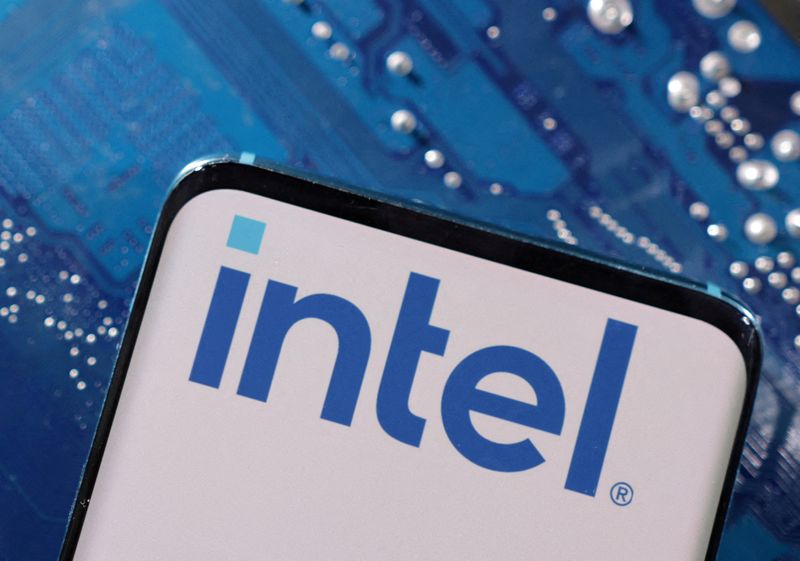By Steven Scheer
JERUSALEM (Reuters) -Israel's government agreed to give Intel (NASDAQ:INTC) a $3.2 billion grant for a new $25 billion chip plant it plans to build in southern Israel, both sides said on Tuesday, in what is the largest investment ever by a company in Israel.
The news comes as Israel remains locked in a war with Palestinian militant group Hamas in the wake of the Oct. 7 Hamas attack on Israel. It also is a big show of support by a major U.S. company and a generous offer by Israel's government at a time when Washington has increased pressure on Israel to take further steps to minimise civilian harm in Gaza.
Shares of Intel, which has a bit less than 10% of its global workforce in Israel, opened up 2.73% at $49.28 on Nasdaq.
The expansion plan for its Kiryat Gat site where it has an existing chip plant that is 42 km (26 miles) from Hamas-controlled Gaza is an "important part of Intel’s efforts to foster a more resilient global supply chain, alongside the company’s ongoing and planned manufacturing investments in Europe and the United States," Intel said in a statement.
Under CEO Pat Gelsinger, Intel has invested billions in building factories across three continents to restore its dominance in chip-making and better compete with rivals AMD (NASDAQ:AMD), Nvidia (NASDAQ:NVDA) and Samsung (KS:005930). The new Israeli plant is the latest investment by the U.S. chipmaker in recent years.
"Support from the Israel government will ... ensure that Israel remains a global center of semiconductor technology and talent," Intel vice president Daniel Benatar said.
Intel had previously received around $2 billion in the past 50 years in Israeli grants in other facilities there.
Ofir Yosefi, deputy director general of Israel's Investments Authority, said Intel chose a higher grant and tax rate over an offer for a lower grant and lower tax rate.
He told Reuters the process took months since a grant of such magnitude needed a review and independent analysis that it was economically viable. It was determined Israel would reap much higher fiscal and economic benefits, he added.
"This investment, at a time when Israel wages war against utter wickedness, a war in which good must defeat evil, is an investment in the right and righteous values that spell progress for humanity," Finance Minister Bezalel Smotrich said.
Intel, whose investment will be over five years, will pay a corporate tax rate of 7.5% instead of 5% previously. The normal tax rate is 23%, but under Israel's law to encourage investment in development areas, companies receive large benefits.
In Germany, Intel plans to spend more than 30 billion euros ($33 billion) to develop two chip-making plants in Magdeburg, as part of a multi-billion-dollar investment drive across Europe to build chip capacity. Berlin has pledged big subsidies to attract Germany's biggest-ever foreign investment.
In 2022, Intel said it would invest up to $100 billion to build potentially the world's largest chip-making complex in Ohio, and rivals Samsung and Taiwan Semiconductor Manufacturing Co or TSMC also have announced big investment plans in the U.S.
In addition to the grant that amounts to 12.8% of the total investment, the chipmaker also committed to buy 60 billion shekels ($16.6 billion) worth of goods and services from Israeli suppliers over the next decade, while the new facility is expected to create several thousand jobs.
Intel, one of around 500 multinationals in Israel, established a presence there in 1974 and now operates four development and production sites, including its manufacturing plant in Kiryat Gat called Fab 28 that produces Intel 7 technology, or 10 nanometer chips, and employs nearly 12,000 people in the country while indirectly employing another 42,000 more.
At some $9 billion, Intel's exports account for 5.5% of total high-tech exports. The Centrino chip, which enables the use of WiFi, and its Core processors were developed in Israel.
Intel, which bought Israeli self-driving auto technologies firm Mobileye for $15.3 billion in 2017, declined to say what technology will be produced at the new Fab 38 plant that Intel says construction is already begun.
In June, Prime Minister Benjamin Netanyahu said Intel would build a new $25 billion chip plant in Israel but Intel until now had declined to confirm the investment.
The Fab 38 plant is due to open in 2028 and operate through 2035.

($1 = 3.6145 shekels)
($1 = 0.9077 euros)